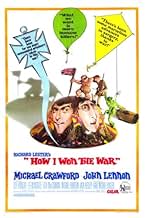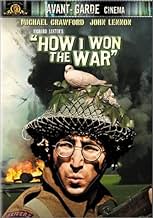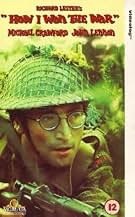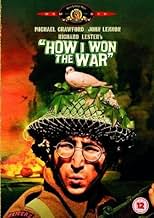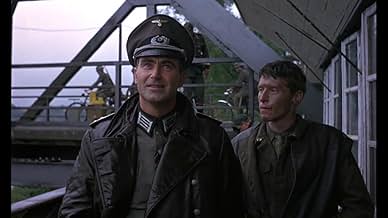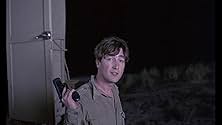IMDb-BEWERTUNG
5,5/10
2626
IHRE BEWERTUNG
Die Geschichte eines britischen Kommandeurs während des Zweiten Weltkriegs, der seine Truppen in eine Reihe von Missgeschicken in Europa und Nordafrika bringt.Die Geschichte eines britischen Kommandeurs während des Zweiten Weltkriegs, der seine Truppen in eine Reihe von Missgeschicken in Europa und Nordafrika bringt.Die Geschichte eines britischen Kommandeurs während des Zweiten Weltkriegs, der seine Truppen in eine Reihe von Missgeschicken in Europa und Nordafrika bringt.
- Regie
- Drehbuch
- Hauptbesetzung
Empfohlene Bewertungen
Take a movie like this. You may have heard somewhere that it was pretty bad. But, being an inquisitive sort, you visit IMDb first anyway. Here, you are greeted with plenty of reviews that tell you that it's not so bad - some even call it a masterpiece and a hidden gem.
Then, you watch it and the cold hard reality hits you - it's just not that good of a movie. The first half an hour seemed to take about four. Yes, there are "innovative" aspects such as tinting people and scenes differently, but ultimately this is cheap and adds little.
There are far better anti-war films of the same period. "How I Won the War" with a big star (Lennon) was made in 1967. Steve McQueen's "The Sand Pebbles" of 1966 is, although a much longer movie, an infinitely better anti-war film that managed to convey all of the same philosophical points as HIWtW (and more) and do it with subtlety, class, and genuine humanity.
The saving grace of HIWtW should have been comedy - absurdist or otherwise. The ingredients were there - war and military life are just asking for the application of ironic and observationalist British wit. Alas, while the characters spend most of the time speaking in that fast British way as if they were saying something as clever as, say, Monty Python or Fawlty Towers, what they actually say is substantially less interesting. Pity.
This film is not particularly worth watching.
Then, you watch it and the cold hard reality hits you - it's just not that good of a movie. The first half an hour seemed to take about four. Yes, there are "innovative" aspects such as tinting people and scenes differently, but ultimately this is cheap and adds little.
There are far better anti-war films of the same period. "How I Won the War" with a big star (Lennon) was made in 1967. Steve McQueen's "The Sand Pebbles" of 1966 is, although a much longer movie, an infinitely better anti-war film that managed to convey all of the same philosophical points as HIWtW (and more) and do it with subtlety, class, and genuine humanity.
The saving grace of HIWtW should have been comedy - absurdist or otherwise. The ingredients were there - war and military life are just asking for the application of ironic and observationalist British wit. Alas, while the characters spend most of the time speaking in that fast British way as if they were saying something as clever as, say, Monty Python or Fawlty Towers, what they actually say is substantially less interesting. Pity.
This film is not particularly worth watching.
Wow, it is not everyday that one comes across a right-wing essay on the IMDB as one of the posters did in regards t this film. First of all, I am delighted to have finally seen this. Aside from "The Royal Flash" and "Cuba," I believe I have seen most of Richard Lester's films which are of significance. I think too look at this film from a mere political pov is a mistake. It is a good statement first of all about how utterly ridicilous the war process is. Sure, there are awful people like Hitler and Mullah Omar, out there who threaten the world at large but by and large, the war process rarely leads to any resounding political solutions and long-term peace and understanding. I think even people who generally support their government's wars would agree to this sentiment. Lester does a brilliant job of poiting this out through the course of this film, and he is helped by some great acting- including a surprisingly brilliant John Lenon to achieve this great satire. Lester, who was actually born in Philadelphia, has a great sense of man's moral faults and he reflects that in this film, as well as in "Petulia"- which is considered to be his best film. I think Lester's genius can even be seen in his two most blatant commerical ventures, "Suprman II" and "Butch and Sundance: The Early Years" as well as the Beatles movies. He deserves more respect, and I think one day he just might get it.
I just saw this film for the first time last Friday night at an American Cinematheque screening in L.A. I had pretty low expectations for it but was curious to see John Lennon in an acting role. You could see this film as a pre-cursor to M*A*S*H, but I think that's giving it too much credit.
In short, the film succeeded in meeting my low expectations. I've seen my share of British cinema and particularly a lot of Monty Python, which this film vaguely recalls, and this was a challenging film for me to watch in terms of understanding the humor, the language, and the slang being used by the characters. The bits of slapstick are good, but there aren't enough of them to save the film. Michael Crawford is really the star of the film, and I discovered that a little of him goes a long way. Ninety minutes of him is too much. As for Lennon, he's mostly a small supporting character, although he's given virtually equal billing with Crawford. If you saw Help! or A Hard Day's Night, you know a little about John's personality, and it shines through in the same way here.
I'd recommend watching this at home on video, where you can stop it and return to it if it gets tiresome, which it probably will. I understand that it's due for a DVD release sometime soon.
In short, the film succeeded in meeting my low expectations. I've seen my share of British cinema and particularly a lot of Monty Python, which this film vaguely recalls, and this was a challenging film for me to watch in terms of understanding the humor, the language, and the slang being used by the characters. The bits of slapstick are good, but there aren't enough of them to save the film. Michael Crawford is really the star of the film, and I discovered that a little of him goes a long way. Ninety minutes of him is too much. As for Lennon, he's mostly a small supporting character, although he's given virtually equal billing with Crawford. If you saw Help! or A Hard Day's Night, you know a little about John's personality, and it shines through in the same way here.
I'd recommend watching this at home on video, where you can stop it and return to it if it gets tiresome, which it probably will. I understand that it's due for a DVD release sometime soon.
No, this not a "lost gem", as some reviewers excitedly proclaim. Far from it.
"How I Won the War? I Bored Them to Death". Main deficiency: a very boring movie. Another deficiency: the gags are practically all unfunny. It's a typical 60s British comedy; good cast, but an atrocious script. Well filmed, though; visually it's pretty decent. However, good for only one or two chuckles. And it was more like a hopeful chuckle, sort of like "I hope this is a sign that something genuinely funny is coming up soon". "How I Can Bore You" would be a more appropriate title. Very disappointing.
A little word about John Lennon, for all you left-wing Lennon fans. (The music is great, hence that's not the issue here.) Lennon was a working-class kid with very little education and even less natural intelligence. His pathetic attempts at "spiritual contentment" - or whatever he used to call it - with that charlatan of an Indian guru sect-leader, plus his marriage to the even bigger charlatan, the totally talent-free Yoko Ono, prove this without an iota of a doubt. He was a very gullible person, what Americans would call "a sucker". But if that isn't enough, his meddling in international politics proved that he had also completely lost his mind by the time he left "The Beatles" and the 70s arrived. Drugs? Too much fame going to his head?
He was also a stark-raving hypocrite, as most "do-gooders" are. All that the world's do-gooders care about is their fame and their image; after all, they have huge EGOS to feed. An example... Michael Caine, in his autobiography "What's It All About?", relates the following episode from the mid-60s when he met Lennon. They were in a luxurious French hotel, desperately looking for a bathroom. All the bathrooms were taken. So John went to a room and urinated from a window. Caine saw him and said angrily that John had stained the curtains. And what was John's reply to this?
"They're rich. F*** 'em."
Of course, the fact that he himself was rich at that point (not to mention later) was of no consequence. Because if someone had decided to stain HIS curtains, in HIS home with urine or excrement, I guess he would have blown his top, screaming injustice. And he'd probably have called the police. The "pigs". Yes, he was so anti-authority, except of course when he needed them to serve HIS little purposes. Just another "do-gooder" hypocrite...
"All we are say-ing, is give peace a chance". If peace is responsible for "heroes" like Lennon, then I'm all for war.
For my review of "Imagine", go to: http://rateyourmusic.com/collection/Fedor8/
To make this IMDb's most unpopular comment ever, please click "No" below.
"How I Won the War? I Bored Them to Death". Main deficiency: a very boring movie. Another deficiency: the gags are practically all unfunny. It's a typical 60s British comedy; good cast, but an atrocious script. Well filmed, though; visually it's pretty decent. However, good for only one or two chuckles. And it was more like a hopeful chuckle, sort of like "I hope this is a sign that something genuinely funny is coming up soon". "How I Can Bore You" would be a more appropriate title. Very disappointing.
A little word about John Lennon, for all you left-wing Lennon fans. (The music is great, hence that's not the issue here.) Lennon was a working-class kid with very little education and even less natural intelligence. His pathetic attempts at "spiritual contentment" - or whatever he used to call it - with that charlatan of an Indian guru sect-leader, plus his marriage to the even bigger charlatan, the totally talent-free Yoko Ono, prove this without an iota of a doubt. He was a very gullible person, what Americans would call "a sucker". But if that isn't enough, his meddling in international politics proved that he had also completely lost his mind by the time he left "The Beatles" and the 70s arrived. Drugs? Too much fame going to his head?
He was also a stark-raving hypocrite, as most "do-gooders" are. All that the world's do-gooders care about is their fame and their image; after all, they have huge EGOS to feed. An example... Michael Caine, in his autobiography "What's It All About?", relates the following episode from the mid-60s when he met Lennon. They were in a luxurious French hotel, desperately looking for a bathroom. All the bathrooms were taken. So John went to a room and urinated from a window. Caine saw him and said angrily that John had stained the curtains. And what was John's reply to this?
"They're rich. F*** 'em."
Of course, the fact that he himself was rich at that point (not to mention later) was of no consequence. Because if someone had decided to stain HIS curtains, in HIS home with urine or excrement, I guess he would have blown his top, screaming injustice. And he'd probably have called the police. The "pigs". Yes, he was so anti-authority, except of course when he needed them to serve HIS little purposes. Just another "do-gooder" hypocrite...
"All we are say-ing, is give peace a chance". If peace is responsible for "heroes" like Lennon, then I'm all for war.
For my review of "Imagine", go to: http://rateyourmusic.com/collection/Fedor8/
To make this IMDb's most unpopular comment ever, please click "No" below.
An anti-war film in disguise... As a "fan" of war films but also a "peacenik" I love this movie. Aside from the fact that i am an overtly biased Beatles' fan this film is an intellectual riot. John Lennon co-stars with the star of Hello Dolly as members of a British military unit saddled with the ridiculous duty of building a cricket pitch during the invasion of North Africa! Filled with ironic black war humor, it suffers a little from the predictable muddle of most 60's films.
Something interesting to note is that John Lennon is first seen wearing his trademark round spectacles in this movie. Having been asked (for some reason) to wear the glasses for the film he continued to wear them for the rest of his life!
This movie is a must for all Lennon fans.
Something interesting to note is that John Lennon is first seen wearing his trademark round spectacles in this movie. Having been asked (for some reason) to wear the glasses for the film he continued to wear them for the rest of his life!
This movie is a must for all Lennon fans.
Wusstest du schon
- WissenswertesThis was the first time John Lennon wore his soon-to-be-trademark granny glasses in public.
- PatzerWhen Goodbody lands on the beach, he eventually comes across rows of helmets with black capercaillie feathers, representing a military graveyard, with a French flag at half-mast. No French troops wore helmets like this, but the Italian Bersaglieiri did.
- VerbindungenFeatured in Film Review: Film Review (1967)
- SoundtracksAuf Wiedersehn, Sweetheart
(uncredited)
Written by Eberhard Storch, English language lyrics written by John Turner and Geoffrey Parsons
Performed by Vera Lynn With Soldiers and Airmen of Her Majesty's Forces
Top-Auswahl
Melde dich zum Bewerten an und greife auf die Watchlist für personalisierte Empfehlungen zu.
- How long is How I Won the War?Powered by Alexa
Details
- Laufzeit
- 1 Std. 49 Min.(109 min)
- Farbe
- Seitenverhältnis
- 1.66 : 1
Zu dieser Seite beitragen
Bearbeitung vorschlagen oder fehlenden Inhalt hinzufügen





